As I enter my kitchen, the smell of cooking veggies and red wine in ratatouille recipe takes me to Provence. Ratatouille dish recipe, a French favorite, has been part of my cooking for years. I remember watching my grandmother layer zucchini, eggplant, and tomatoes, filling each bite with her love and family wisdom.
Today, I’m thrilled to share a simple yet true Ratatouille dish recipe. It adds red wine’s depth and complexity. This dish is perfect for both experienced cooks and those new to French food. It will take you on a taste journey that will amaze you.
Table of Contents
The Rich History of Traditional French Ratatouille
Ratatouille dish recipe, a beloved French dish, has a rich history. It started in Provence, a sunny region. This vibrant stew went from a peasant dish to a global icon, loved for its taste and cultural value.
Origins in Provence
The story of Ratatouille dish recipe begins in Provence’s rural areas. Farmers and cooks would mix fresh veggies like zucchini, eggplant, and tomatoes. They called it “ratafia,” meaning “to stir up.”
Evolution Through Generations
Ratatouille spread across France, changing slightly in each place. Chefs and families added their own touches. This made Ratatouille dish recipe a special part of French cooking.
Cultural Significance
Ratatouille is more than food; it’s a symbol of French life and joie de vivre. It’s famous thanks to movies like “Ratatouille.” Now, it’s a beloved part of French culture worldwide.
“Ratatouille is not just a dish, it’s a way of life. It’s a celebration of the simple pleasures that come from combining fresh, local ingredients with care and passion.”
Essential Ingredients for Authentic Ratatouille
Ratatouille dish recipe is a classic French vegetable stew known for its rich flavors and vibrant colors. It’s made with fresh, seasonal ingredients that come together to create a unique culinary experience. Let’s explore the key components that make ratatouille so special.
The base of ratatouille is three main vegetables: eggplant, zucchini, and tomatoes. These vegetables create a smooth and velvety texture. Eggplant adds a creamy texture, zucchini brings a nice crunch, and tomatoes balance the flavors with their sweetness and acidity.
Onions and garlic are also important. They add a savory flavor that makes the dish irresistible. Fresh herbs like basil, parsley, and thyme add a fragrant touch that enhances the taste.
The quality and freshness of the ingredients are crucial for an authentic Ratatouille dish recipe. Using the best seasonal vegetables and herbs is key to capturing the true essence of this French dish.
| Ingredient | Purpose | Substitutions |
|---|---|---|
| Eggplant | Provides a creamy, meaty texture | Zucchini or summer squash |
| Zucchini | Adds crunch and juiciness | Yellow squash or pattypan squash |
| Tomatoes | Contribute acidity and sweetness | Canned diced tomatoes or roasted red peppers |
| Onions | Impart savory, caramelized flavor | Shallots or leeks |
| Garlic | Enhances the overall aroma and taste | Garlic powder or granulated garlic |
| Herbs (basil, parsley, thyme) | Provide fragrant, herbaceous notes | Dried herbs or a combination of fresh herbs |
Knowing the essential ingredients and their roles in Ratatouille dish recipe helps you make a true French classic at home.
Why Red Wine in Ratatouille Recipe Elevates This Classic Dish
Ratatouille is a beloved French dish loved by food lovers everywhere. The addition of red wine makes it truly special. As a home cook, I’ve seen how red wine enhances this colorful vegetable mix.
Selecting the Perfect Red Wine in Ratatouille Recipe
Finding the right red wine for ratatouille can be tough. Look for a wine with good acidity and tannins. I like a medium-bodied red, like Cabernet Sauvignon or Merlot, for their flavor balance.
Wine’s Effect on Flavor Profile
When red wine is added to Ratatouille dish recipe while it cooks, magic happens. The wine’s acidity cuts through the vegetables’ richness. The tannins add a touch of bitterness that balances the sweetness. As it cooks, the wine’s flavors blend with the vegetables, creating a delicious, complex taste.
| Wine Characteristic | Impact on Ratatouille |
|---|---|
| Acidity | Helps to cut through the richness of the vegetables |
| Tannins | Adds a subtle bitterness that balances the sweetness |
| Flavor Compounds | Meld with the vegetables to create a complex, harmonious taste |
Choosing the right red wine and adding it to Ratatouille dish recipe opens up a world of flavors. It’s like a trip to Provence for your taste buds. The red wine in ratatouille recipe is a culinary gem that every home cook should try.
Kitchen Tools and Equipment Needed
Preparing the classic French ratatouille dish recipe requires the right tools. From the essential skillet to the perfect cutting board, we’ll cover the must-haves. These items help create this flavorful vegetable medley.
You’ll need a large, heavy-bottomed skillet or Dutch oven to start. It should have enough space for sautéing and simmering the vegetables. A 12-inch or larger pan is best.
- Sharp chef’s knife or santoku knife for precise vegetable chopping
- Sturdy cutting board to provide a stable surface for prepping ingredients
- Vegetable peeler for easily removing skins from eggplant, zucchini, and other produce
- Measuring cups and spoons for accurately portioning out herbs, wine, and other key components
If you have limited space or equipment, a smaller skillet works. A paring knife can replace a chef’s knife. A mandoline slicer also helps get the thin, even slices needed for the ratatouille dish recipe.
With the right tools, you’re ready to make an authentic and stunning ratatouille dish. It will delight your senses and take you to Provence.
Preparing Your Vegetables for Ratatouille
Making a real Ratatouille dish recipe dish needs careful attention to the ratatouille ingredients. From washing and peeling to precise cutting, each step is crucial. It brings out the vibrant flavors and textures that make this French dish so loved.
Proper Cutting Techniques
Start by washing all the veggies well to get rid of dirt. Peel the eggplant, zucchini, and onions. Leave the bell peppers and tomatoes unpeeled. Cut the eggplant, zucchini, and bell peppers into 1/2-inch thick rounds for even cooking.
Dice the onions and mince the garlic cloves. This step is important for the dish’s success.
Size and Shape Recommendations
| Vegetable | Recommended Size and Shape |
|---|---|
| Eggplant | 1/2-inch thick rounds |
| Zucchini | 1/2-inch thick rounds |
| Bell Peppers | 1/2-inch thick rings |
| Tomatoes | Quartered or halved |
| Onions | Diced |
| Garlic | Minced |
Following these size and shape tips helps all the Ratatouille dish recipe ingredients cook evenly. This results in a dish with perfect flavors and textures.
Red Wine in Ratatouille Recipe: Step-by-Step Guide
Adding red wine to the classic French Ratatouille dish recipe makes it even more special. This guide will show you how to add red wine to your ratatouille. It will make your dish taste amazing.
- Start by cutting your vegetables into small pieces. Make sure they’re all the same size so they cook evenly.
- Heat some olive oil in a big skillet or Dutch oven over medium heat. Cook the onions until they’re soft and smell good.
- Put the eggplant, zucchini, and bell peppers in the pan. Cook them, stirring now and then, until they start to get soft. This should take about 10-12 minutes.
- Now, add a good amount of red wine to the pan. Let it simmer, uncovered, for 5-7 minutes. This lets the flavors mix and the alcohol cook off.
- Mix in the crushed tomatoes, garlic, thyme, salt, and pepper. Taste and adjust the seasoning as needed.
- Lower the heat and cover the pan. Let the Ratatouille dish recipe simmer for 20-25 minutes more. Stir it every now and then until the veggies are tender and the flavors are rich.
Adding red wine at the right time makes your ratatoille taste even better. The wine’s acidity balances the sweetness of the tomatoes and veggies. Its fruity flavors also enhance the dish’s earthy and herbal tastes.
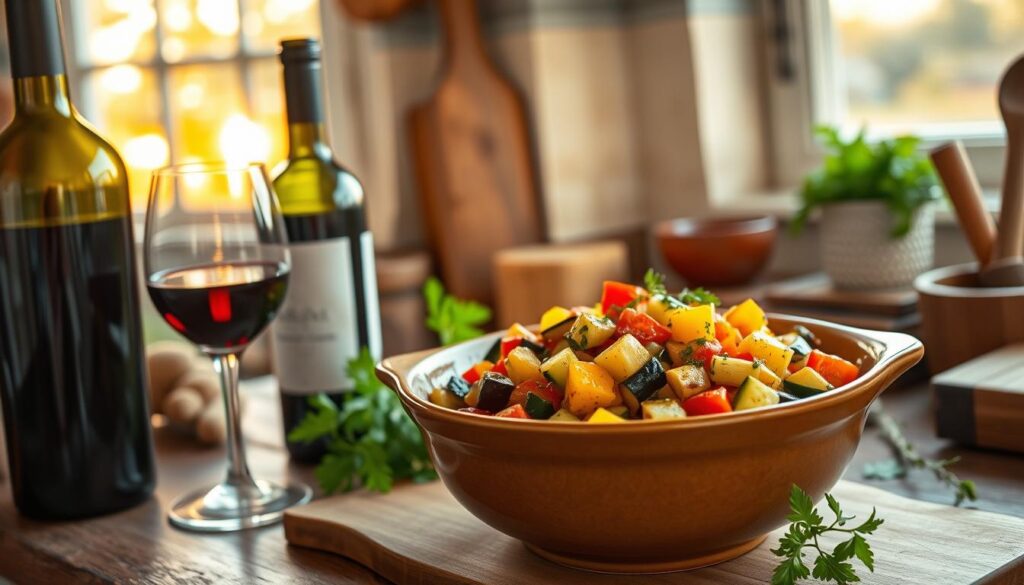
“The secret to an exceptional ratatouille is all in the layering of flavors. The red wine is the key to unlocking the full potential of this classic French dish.”
When you add the red wine is very important. Letting it simmer with the veggies makes the flavors blend perfectly. This creates a delicious and memorable ratatouille experience.
Layering Techniques for Perfect Presentation
The presentation of the classic ratatouille dish recipe is key. Traditional French Ratatouille dish recipe shows off a rustic, layered look. But, modern takes offer more striking visuals, showcasing vibrant colors and textures.
Traditional vs. Modern Arrangements
The traditional Ratatouille dish recipe layers vegetables in a baking dish. This creates a beautiful cross-section when served. It highlights the natural shapes and patterns of the ingredients, celebrating its homestyle roots.
On the other hand, some chefs go for artistic, geometric arrangements. They stack or fan the vegetables for a striking, contemporary look.
Visual Appeal Tips
- Experiment with color balance: Arrange the vegetables in a visually pleasing way, ensuring a harmonious blend of hues.
- Consider texture and shape: Vary the slicing techniques to create visual interest, from thin ribbons to chunky cubes.
- Garnish with fresh herbs: A sprinkle of chopped basil, thyme, or parsley can add a vibrant, finishing touch.
- Utilize contrasting patterns: Alternate the orientation of the vegetable slices to create a mesmerizing, layered effect.
Whether you choose the classic, rustic look or a modern, artistic arrangement, the secret to a stunning ratatouille dish recipe is in the details. By mastering layering, you can turn this beloved French dish into a feast for the senses.
Cooking Temperature and Timing Guidelines
To make the perfect Ratatouille dish recipe or rattatouie, you need to focus on cooking temperature and timing. Each vegetable has its own cooking needs to get the right texture and taste.
Start by roasting the eggplant at 400°F (204°C) for 20-25 minutes. This makes the eggplant soft inside and slightly charred outside. This adds a rich flavor to the dish.
- Sauté the onions and garlic in olive oil over medium heat for 5-7 minutes until they’re soft and smell good.
- Add the zucchini and bell peppers, and cook for 10-12 minutes, stirring now and then. They should be tender but still firm.
- Then, add the roasted eggplant and tomatoes. Simmer for 15-20 minutes more. This lets all the flavors mix well and the texture come together.
| Vegetable | Cooking Temperature | Cooking Time |
|---|---|---|
| Eggplant | 400°F (204°C) | 20-25 minutes |
| Onions and Garlic | Medium Heat | 5-7 minutes |
| Zucchini and Bell Peppers | Medium Heat | 10-12 minutes |
| Entire Mixture | Simmer | 15-20 minutes |
By sticking to these cooking times and temperatures, your ratatouille or rattatouie will be perfect. It will have tender veggies and deep, rich flavors.
“Ratatouille dish recipe is a dish that requires patience and attention to detail, but the rewards are well worth it. The perfect ratatouille is a symphony of flavors, textures, and colors.”
Seasoning and Herb Combinations
Ratatouille is a famous French dish known for its amazing flavors. At its core, it’s all about the right mix of herbs and spices. Whether you like the classic way or a new twist, the right seasonings can make this dish shine.
Fresh vs. Dried Herbs
The debate between fresh and dried herbs in Ratatouille dish recipe is long-standing. Dried herbs are convenient and pack a punch of flavor. On the other hand, fresh herbs add a bright, fresh taste. Mixing both can create a perfect balance, with fresh herbs bringing a lively taste and dried herbs adding depth.
Regional Spice Variations
Ratatouille dish recipe has changed over time and across France. Each region has its own spice mix, giving the dish a unique flavor. From Provence’s herbes de Provence to the north’s sweet paprika, the ratatouille ingredients vary, weaving a rich tapestry of flavors.
| Region | Signature Spices |
|---|---|
| Provence | Thyme, rosemary, basil, bay leaf |
| Languedoc | Garlic, chili peppers, paprika |
| Normandy | Parsley, chives, mustard |
Exploring these regional flavors can open up a world of taste. It lets home cooks make their Ratatouille dish recipe special and dive into France’s rich culinary history.
“The key to a truly exceptional Ratatouille dish recipe lies in the perfect balance of herbs and spices, each one contributing its unique character to the dish.”
Common Mistakes to Avoid
Making a delicious Ratatouille dish recipe can be a fun cooking journey, but it has its challenges. As a home cook, I’ve faced many obstacles. Here, I’ll talk about common mistakes to avoid when making your red wine in ratatouille recipe.
- Overcooking the Vegetables: One big mistake is letting the veggies get too soft. This makes the ratatouille taste bad. It’s important to keep them tender but still a bit crunchy.
- Using Too Much Oil: Ratatouille needs some oil for cooking, but too much makes it greasy. It’s all about finding the right balance for the best taste and texture.
- Inadequate Seasoning: Seasoning well is key to making the red wine in ratatouille recipe shine. Too little seasoning makes it taste dull, while too much can overpower the flavors.
- Rushing the Cooking Process: Ratatouille needs patience and focus. Hurrying can cause some veggies to cook too long or too short.
- Failing to Layer Properly: Layering the veggies is important for both looks and taste. Skipping this step can mess up the dish’s appearance and flavor.
If you hit any of these common problems, don’t worry. With a bit of fixing and some cooking tips, you can still make a great dish. Ratatouille is a forgiving recipe. With each try, you’ll get better and find your own way to make it perfect.
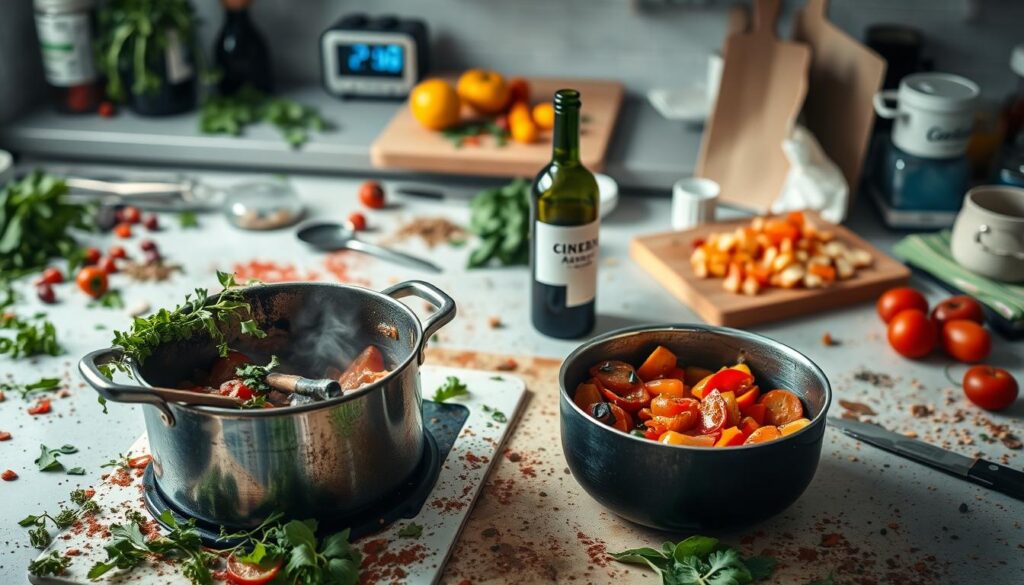
“The key to a great ratatouille is not to overcook the vegetables. They should retain their shape, texture, and bright colors.”
Serving Suggestions and Pairings
There are many ways to enjoy the classic ratatouille dish. It’s great as a main course with crusty artisanal bread. This lets you soak up the rich sauce. You can also serve it with grilled or roasted meats for a fuller meal.
For a lighter option, ratatouille goes well with grilled fish or sautéed shrimp. This makes for a refreshing and light meal.
Complementary Side Dishes
Pairing ratatouille with side dishes can enhance the experience. Creamy polenta or fluffy steamed rice are good choices. They let the ratatouille’s flavors shine.
Adding roasted or grilled vegetables like asparagus, zucchini, or eggplant is also a great idea. They add color and flavor, making the dish more appealing.
Wine Pairing Recommendations
Choosing the right wine is key for ratatouille. A medium-bodied red wine, like a Côtes du Rhône or Malbec, is perfect. These wines balance the dish’s richness with their acidity and tannins.
They also complement the herbs and spices in the ratatouille. This makes for a well-rounded and enjoyable meal.
| Wine Varietal | Tasting Notes | Why It Works |
|---|---|---|
| Côtes du Rhône | Medium-bodied with notes of red fruit, spice, and a touch of earthiness | The bold flavors and acidity in the wine balance the ratatouille’s rich, tomato-based sauce |
| Malbec | Full-bodied with flavors of dark fruit, chocolate, and a subtle hint of oak | The wine’s robust tannins and bold fruit profile complement the bold flavors of the ratatouille |
Pairing ratatouille with the right side dishes and wine makes it unforgettable. This classic French ratatouille dish recipe becomes a memorable dining experience.
Storing and Reheating Tips
Enjoying ratatouille doesn’t have to stop after one meal. You can keep the flavors alive with the right storage and reheating. This way, you can enjoy this classic French dish for longer.
Refrigerating Ratatouille Leftovers
To store leftover ratatouille, put it in an airtight container and chill it. It stays fresh for up to 5 days. To reheat, use the stovetop or microwave, stirring until it’s hot.
Freezing for Future Enjoyment
Ratatouille freezes well for longer storage. Cool it down, then put it in freezer-safe containers or bags. It can stay frozen for up to 3 months. Thaw it in the fridge overnight and then reheat until hot.
| Storage Method | Shelf Life | Reheating Tip |
|---|---|---|
| Refrigerator | Up to 5 days | Reheat on the stovetop or in the microwave, stirring occasionally until heated through. |
| Freezer | Up to 3 months | Thaw in the refrigerator overnight, then reheat on the stove or in the oven until hot. |
Leftover ratatouille is great for many dishes. Try it on crostini, in omelets, or as a side with grilled meats or fish. It’s a versatile French classic.
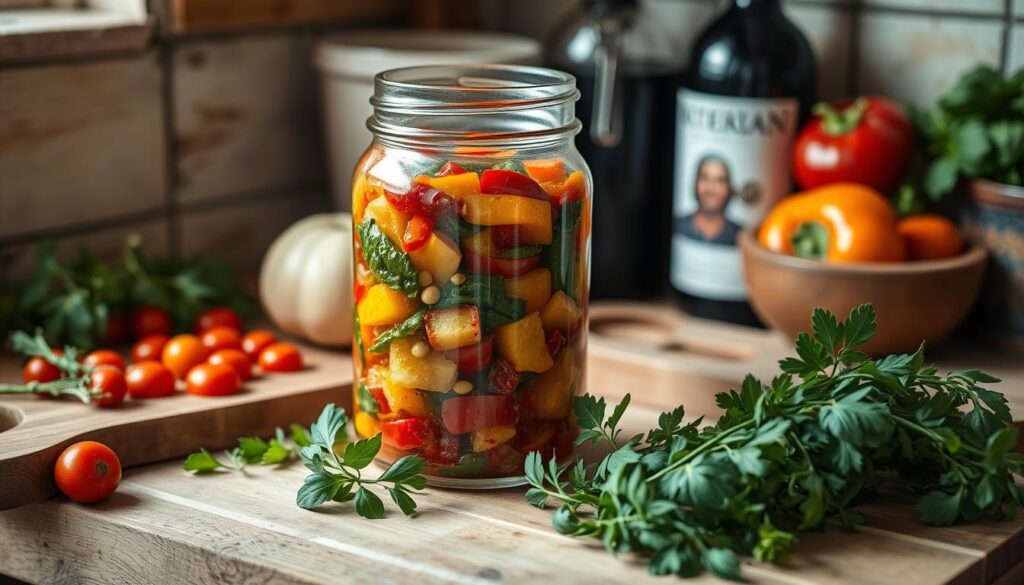
“Ratatouille is a dish that gets better and better the longer it sits. The flavors have time to meld and develop, making it an even more delicious leftovers.”
Health Benefits of Ratatouille dish recipe
Ratatouille dish recipe is a classic French dish that’s not just tasty but also super healthy. It’s made with zucchini, eggplant, bell peppers, and tomatoes. These summer veggies make ratatouille a nutritional powerhouse.
This dish is full of fiber, thanks to its mix of veggies. Fiber helps keep your digestive system healthy and makes you feel full. It also helps control blood sugar and supports heart health.
The veggies in Ratatouille dish recipe, like tomatoes and bell peppers, are full of antioxidants. These antioxidants fight off harmful free radicals. They help lower the risk of chronic diseases and keep your cells healthy.
| Nutrient | Amount per Serving | % of Daily Value |
|---|---|---|
| Fiber | 5 g | 18% |
| Vitamin C | 40 mg | 67% |
| Vitamin A | 800 IU | 16% |
| Potassium | 400 mg | 11% |
Ratatouille is also packed with vitamins and minerals like vitamins C, A, and K, and potassium. These nutrients boost your immune system, help your eyes, and support bone health. So, ratatouille is not just good for you, it’s also delicious.
If you want to eat more veggies, feel better, or just enjoy a tasty French dish, ratatouille is perfect. Adding it to your meals is a great way to take care of your health.
Vegetarian and Vegan Modifications
If you follow a vegetarian or vegan diet, you can still enjoy Ratatouille dish recipe. Just make a few simple changes to make it fit your plant-based lifestyle. This way, you can savor the rich flavors of this French classic.
Plant-Based Alternatives
Swap out the usual meat broth for a vegetable broth. You can also use a bean or lentil stock for extra protein. For a deeper flavor, add sautéed mushrooms or a bit of soy sauce or tamari. Grilled or roasted eggplant adds a meaty texture to your Ratatouille dish recipe.
Protein Addition Options
To make your Ratatouille dish recipe more filling, add tofu, tempeh, or seitan. These can be cubed and cooked with the veggies. Or, layer them in for a heartier dish. Serving it over quinoa, bulgur, or farro also increases the protein.
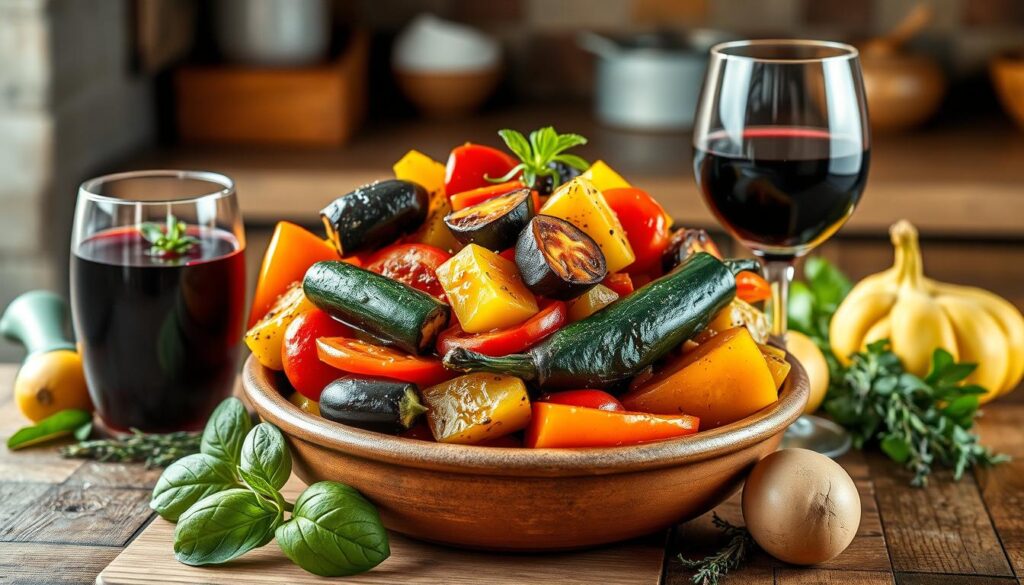
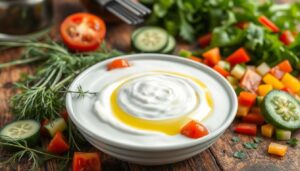
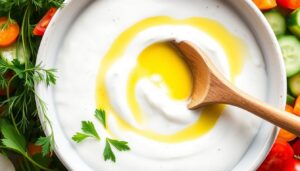
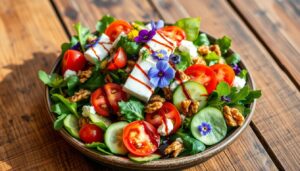
1 thought on “Red Wine in Ratatouille Recipe: A Classic Delicious Twist”